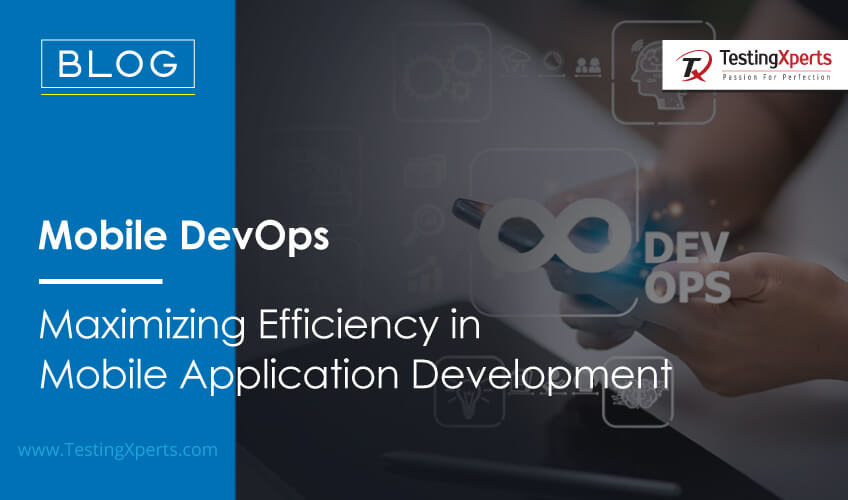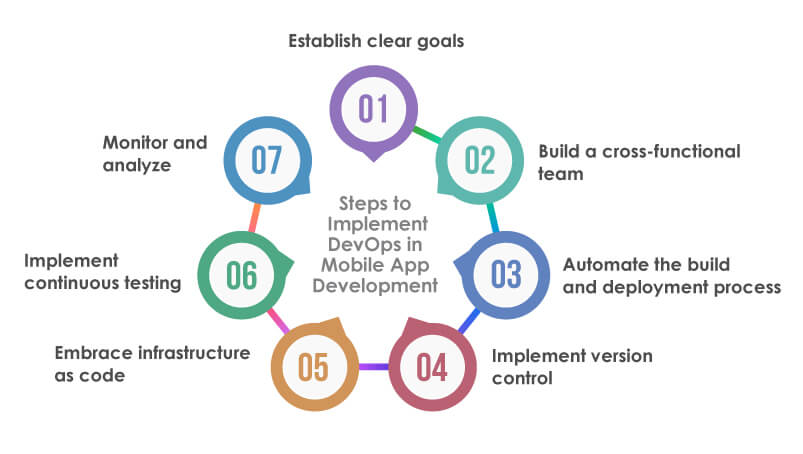Recommended Blogs
Mobile DevOps – Maximizing Efficiency in Mobile Application Development

- What is Mobile DevOps?
- How is Mobile DevOps Different from Agile App Development?
- Benefits of Implementing DevOps in Mobile App Development
- Steps to Implement DevOps in Mobile App Development
- Key Elements of Mobile DevOps Practices
- How can TestingXperts help you in Implementing DevOps in Mobile Application Development?
- Conclusion
Mobile DevOps is the integration of DevOps principles into the development and delivery of mobile applications. Its primary objective is to streamline the mobile app development lifecycle, enhance collaboration between development and operations teams, and automate processes for faster and more reliable app releases. By adopting DevOps methodologies, organizations can automate critical processes like continuous integration and delivery (CI/CD), ensuring a seamless mobile app development experience.
Several surveys conducted by Dimensional Research and Perfecto Mobile shed light on the increasing importance of DevOps practices in mobile application development. Approximately 60% of organizations have implemented CI/CD for their mobile app development, while 70% leverage automation tools for their mobile DevOps practices.
Despite these advancements, security remains a significant challenge in mobile DevOps. A report by Capgemini reveals that 77% of organizations consider security to be their primary concern in this context. This underscores the necessity for secure coding practices and robust security testing throughout the mobile application development process. Overall, the integration of DevOps principles into mobile application development is revolutionizing the industry, enabling organizations to deliver high-quality apps with greater efficiency and agility.
What is Mobile DevOps?
Mobile DevOps refers to the process of integrating DevOps practices into mobile app development. DevOps is a software development methodology that emphasizes collaboration, automation, and continuous delivery. By applying DevOps practices to mobile app development, teams can streamline their development processes, reduce errors, and deliver high-quality apps faster.
Some Common Mobile DevOps Practices Include:
• Continuous integration and Continuous Delivery (CI/CD) pipelines
• Automated testing
• Mobile device testing and emulation
• Version control and code management
• Collaboration and communication tools
How is Mobile DevOps Different from Agile App Development?
• DevOps brings together development and operations teams, while Agile emphasizes collaboration, customer feedback, and frequent small releases.
• DevOps prioritizes continuous testing and delivery, whereas Agile prioritizes constant changes.
• DevOps employs both shifts left and right principles, whereas Agile mainly focuses on shift-left principle.
• DevOps places more emphasis on operational and business readiness, while Agile focuses more on functional and non-functional readiness.
Benefits of Implementing DevOps in Mobile App Development

Faster release time:
DevOps tools used in mobile app development allow for almost immediate collaboration among teams, particularly the operations and delivery teams. This ultimately reduces the time required from a design and development standpoint.
Improved communication and collaboration:
DevOps in mobile development can enhance communication and collaboration by promoting cross-functional collaboration, automating processes through CI/CD, and providing real-time feedback on the status of builds and deployments.
Quality control:
DevOps in mobile development can improve quality control by automating testing processes through CI/CD, promoting collaboration and communication, and providing real-time feedback on the status of builds and deployments.
Efficient use of resources:
DevOps promises to enable fast feature delivery, updates, and new builds by ensuring seamless collaboration between operations and development teams. Automation is heavily used in DevOps to optimize resource usage. From source code management to development platforms and testing tools, automation is relied upon to facilitate instant and frequent releases.
Instant feedback:
DevOps provides the advantage of receiving immediate reports and feedback, as well as complete transparency into the development and regression testing process for stakeholders. This transparency allows mobile app development teams to quickly troubleshoot issues, fix, refactor, and optimize the user experience.
Eliminate bottlenecks and inefficiencies:
The goal of DevOps is to make processes more transparent, effective and improve communication. The alignment regarding the tools, processes, and practices plays an important role in removing bottlenecks and inefficiencies.
Steps to Implement DevOps in Mobile App Development

Establish clear goals:
• Improve app quality, reduce time-to-market, enhance collaboration between teams.
• Ensure goals align with overall business objectives.
• Share goals with stakeholders for understanding and commitment.
• Set measurable and achievable targets to track progress and evaluate effectiveness.
Build a cross-functional team:
• Determine roles for developers, testers, operations, and relevant stakeholders.
• Encourage open communication and regular meetings to promote shared understanding and ownership.
• Ensure access to necessary training and resources for DevOps skills enhancement.
• Clearly define tasks and responsibilities to avoid confusion and duplication.
• Foster a culture of exploring new technologies and best practices in DevOps.
Automate the build and deployment process:
• Set up a CI system to automate building, testing, and integrating code changes.
• Automate testing processes, including unit tests, integration tests, and end-to-end tests.
• Utilize containerization with tools like Docker for consistent and portable deployment.
• Implement continuous delivery (CD) to automate deploying code changes to production environments.
• Use monitoring tools to analyze the performance of the mobile app in real-time.
Implement version control:
• Select Git, SVN, or Mercurial based on your needs.
• Set up a repository to store source code and collaborate with team members.
• Establish strategies to manage parallel development and smooth integration of code changes.
• Implement code reviews, including peer reviews, automated reviews, and continuous integration.
• Utilize tags and releases to mark milestones and track changes in the codebase.
Embrace infrastructure as code:
• Adopt Ansible, Chef, or Puppet to automate provisioning and configuration of infrastructure resources.
• Use Terraform or CloudFormation to provision infrastructure resources in a consistent and repeatable manner.
• Implement testing and validation processes for infrastructure changes to ensure they meet the desired state.
Implement continuous testing:
• Cover different types of tests, including unit, integration, functional, performance, and security tests.
• Use automated testing tools and frameworks to save time and effort, ensure consistency, and enable faster feedback on code changes.
• Run tests automatically whenever there is a code change, or a new build is deployed to catch bugs and issues early.
• Write tests before writing the actual code to ensure desired functionality and behavior and act as documentation for future reference.
• Use monitoring tools to track and analyze test results to identify patterns, trends, and areas for improvement in the testing process.
Monitor and Analyze
• Determine KPIs and metrics such as response time, error rates, resource utilization, and user engagement.
• Choose tools like Prometheus, Grafana, or New Relic to collect and analyze metrics in real-time.
• Configure alerts based on predefined thresholds to proactively address issues.
• Analyze logs to gain insights into errors, exceptions, and important events for troubleshooting and improving app performance.
• Experiment with different features or user experiences and analyze the impact on metrics like user engagement and conversion rates.
Key Elements of Mobile DevOps Practices

Continuous Planning:
It allows DevOps to create a solid strategy that aids in making the most effective mobile applications for types of enterprises.
Continuous Integration:
Developing code collaboratively is important to ensure that different teams can easily integrate their work. In DevOps, Continuous Integration emphasizes the need for regular builds that are free of errors and can be smoothly combined with the most recent code changes.
Continuous Testing:
Testing plays a critical role in the app development process as it helps to detect errors and issues in the application at an early stage, thereby ensuring that high-quality products are delivered to the end-users.
Continuous Testing is primarily focused on testing frequently and at an early stage of the development cycle.
Continuous Monitoring:
DevOps enables developers to conduct extensive testing and monitoring prior to deploying the app to end users. Continuous monitoring plays a crucial role in detecting and resolving issues. It ensures that the development process remains stable, even with significant changes, without requiring human intervention. This ultimately guarantees that the app is stable and performs according to expectations.
Continuous Delivery:
Continuous delivery is a software development practice that involves releasing updates in smaller increments, allowing for the possibility of releasing the software at any given time. With DevOps in mobile application development, changes in code are deployed immediately after they are made. The main aim of continuous delivery is to speed up the process of building, testing, and releasing software to customers in shorter cycles.
Continuous Deployment:
Continuous delivery is a software development practice that involves releasing updates in smaller increments, allowing for the possibility of releasing the software at any given time. With DevOps in mobile application development, changes in code are deployed immediately after they are made. The main aim of continuous delivery is to speed up the process of building, testing, and releasing software to customers in shorter cycles.
Conclusion
Mobile DevOps stands at the forefront of revolutionizing efficiency in mobile application development. It offers a holistic and collaborative framework that significantly impacts the entire development lifecycle. By incorporating automation, continuous testing, and streamlined workflows, Mobile DevOps not only accelerates the pace of development but also enhances the reliability and quality of mobile applications. The real-time feedback loops, improved collaboration, and resource optimization contribute to a more agile and responsive development environment. Mobile DevOps empowers businesses to stay ahead in a dynamic industry, encourage innovation, and provide a strategic edge by efficiently delivering high-quality mobile applications that meet the ever-changing demands of users.
How can Tx help you in Implementing DevOps in Mobile Application Development?
Tx is a leading Digital Assurance and Quality Engineering services company that helps organizations maximize efficiency in mobile application development through its Mobile DevOps approach. Here are some ways in which TestingXperts can help organizations achieve:
• Providing end-to-end testing services for mobile applications.
• Ensuring that the application is tested on various devices and platforms.
• Implementing automation testing to speed up the testing process.
• Providing continuous integration and delivery to ensure that the application is always up to date.
• Implementing security testing to ensure that the application is secure.
• Providing performance testing to ensure that the application performs well under different conditions.
• Providing usability testing to ensure that the application is easy to use and navigate.
Discover more
